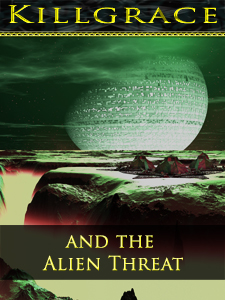“It’s just the storm,” Yemec said. “Don’t worry, we’ve had worse.”
“Just a guess, but would one of those times be around the time the Captain died?”
“Yes.” Yemec said after thinking for a moment. “I’d have to check the reconds but I think they were both around the worst of the storm.” Susan nodded rather than answering, saving her breath. The pieces were coming together.
#
“What’s next?” Yemec asked, as they entered the medical bay.
“I need to take another blood sample.”
“What for? Wouldn’t the doctor – ” he stopped. “I’m sorry, I’m under some strain.”
“Understood.” Opening the freezer, she drew a second set of blood samples from the doctor’s body. These she did not place on a slides, instead filling a small set of test tubes.
“What are you looking for?”
“Gas levels,” Susan said.
“You think they’ve tampered with life support?” Yemec asked, and Susan raised an eyebrow.
“I thought you were the one that didn’t believe in aliens.” To her relief, he laughed. “Your crew are space-faring, correct? You don’t often land on planets.”
“No. Who does?” He sounded a little surprised.
“How well do your people know – ?” She never managed to finish as the door slid open. A metallic, very alien, shape filled it. Yemec jumped up with a cry. It ignored him.
“I have completed resource acquistion. We shall depart.”
“I haven’t finished,” Susan said, adjusting focus on the microscope.
“Irrelevant.” The Cull’s main manipulator extended and gripped her upper arm, pulling her out of the room. It turned, pushing her inexorably towards the Capsule. Susan struggled, protesting, but she could not break its hold.
“You’re hurting me.”
“Irrelevant.”
“Hardly, as you will find out,” she retorted, pulling the key out of her pocket and unlocking the Capsule. The Cull shoved her inside and she caught herself on the bench. Instantly the lights went out, and the steady hum of the workings died. She sat down and looked at the alien calmly. The Cull’s sensors moved and rotated wildly, as she watched the patterns the lights made as they moved under the the metal. It quickly reached a decision and, very deliberately, three blue lights rotated and stopped, focusing on her.
“You will repair this,” the thing shrieked.
“I can’t. The Capsule detected duress and shut down. Once I no longer perceive myself to be at risk, the Capsule will re-activate.”
“You are not at risk.” She looked pointedly at the gun barrel, and rubbed her arm where she had been grabbed.
“It will take time for me to be sure of that.”
“Unacceptable.”
“So is hurting me,” she said, with some asperity, “and you were aware the fail-safe existed.”
“Estimated time until reactivation?”
“Give it an hour or two and I should be calm enough not to kick it off again.” She stood up, opening the door. “Now, if you don’t mind, I have an investigation to complete.”
“You will remain here.”
“Under duress?” she asked archly. The Cull actually juddered in frustration. Susan reminded herself she was taunting a military-grade killing machine, equipped with a matter disruptor and thermal lance among other weapons, and she resorted to a more reasonable tone. “Spending an hour sitting here is an inefficient use of time. If I am working on something, it will distract me and I will calm down more quickly.”
“Then commence working.” The Cull did not follow her, but its sensor lights moved and rotated. They were trained on her until the corridor door closed.
Outside the sickbay she took a moment to straighten her blouse, and smooth the rumples out of her jacket, using the time to collect herself. Being dragged down a corridor by a Cull was not a pleasant experience, and showing distress in front of Yemec who was already on edge could only make the situation worse. She needed him to listen, not start wondering what else was going on. Perfectly composed she walked into the room, and back to the microscope.
“What was that thing?” Yemec demanded.
“A mis-programmed research android,” Susan lied. If they did not already know about Culls, explaining would take too long. If they did, the crew would run screaming and that would make scientific co-operation difficult. “Did you finish the tests?”
“Yes.” He gestured at the bench, “but there’s nothing unusual with the blood sample. Oxygen levels normal. No harmful or unexpected gases.”
“I was afraid of that. Does that test for anything else?” As he shook his head, she sighed wondering if the answer could really be so simple. “Yemec, what’s the usual highest pressure you’ve experienced working in spacecraft – atmospheric pressure?”
“Two atmospheres.” He laughed slightly. “That’s when you start worrying about the ship springing a seam somewhere vital and venting to space. Low pressure will kill you really quick.”
“So you aren’t familiar with the long-term effects of higher pressures,” she said, and he sobered instantly at her tone.
“You know what this is,” he said, “and you are going to tell me. Now.”
“I think – I’m not sure – that it’s a medical condition: nitrogen narcosis or rapture of the deeps. It’s a side-effect of the way that gases under pressure are handled by your body. You get it out by lowering pressure, slowly, or you kill the patient. Can we put the blood sample in an isolation chamber? I’m going to lower the pressure on the sample as a final check.”
“Feel free, but the pressure gauge is broken.” He nodded to the discarded instrument, and Susan picked it up. The needle was jammed against the maximum setting. She shook it, and it didn’t move. Feeling a chill up her spine she connected the probe anyway, smiling reassuringly at Yemec.

